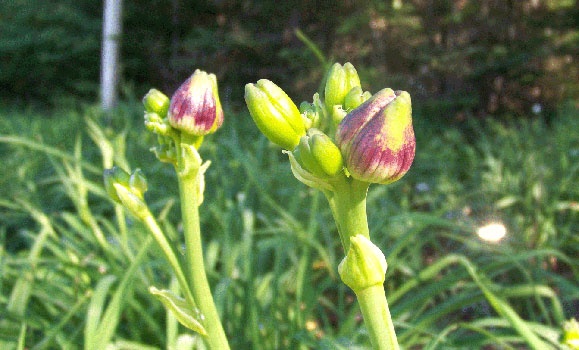News
» Go to news mainStudent Researcher needs your help

Alicia Cattiaux-Fraser is a fourth year Faculty of Agriculture student doing an Honours project on an invasive pest of daylilies (the gall midge) in Atlantic Canada.
In an effort to determine how widely the pest is distributed within Atlantic Canada, Alicia is working to map its distribution through use of a short survey and is working with the provincial Daylily Association to collect samples for genetic analysis and look for highly susceptible cultivar.
“I chose this project because it encompasses both subjects I am studying -plant science and genetics/molecular biology,” explained Alicia. “I love working in the field as much as working precisely in a lab. If I can find a way to do both after graduation, like in this project, that would be golden!”
What is a gall?
The daylily gall midge is an insect that causes formations of a gall. A gall is a distinctive plant structure that is formed when some herbivorous insects feed on the plant. As the larvae feeds, chemicals in the larval saliva cause the plant to form unusual structures that serve as habitat for the insect. In the daylily gall midge, the insect lays its eggs within a developing daylily bud. This causes the bud to swell to unusual shapes. The daylily flower either appears highly deformed, fails to open, or rots off. The bud is full of small (2-5mm) nearly transparent maggots. These maggots will then develop into pupae, emerge the following summer and re-infect daylilies causing loss of flowers. Presence of this pest may pose a barrier for people selling their plants to other parts of the country.
What is the project?
Alicia is completing this research as part of her B.Sc (Hons) in Agriculture with a Major in Plant Science. Alicia hopes to determine whether the damage being observed is caused by the daylily gall midge or something else. She has also provided all members of the Daylily society with sample vials to collect any affected daylily buds they might find. She has also reached out to various garden clubs in the area to find samples. By mailing affected buds to Dalhousie, Alicia and her team will use molecular biology tools to determine whether these symptoms are being caused by the daylily gall midge, or something else altogether.
Action/How you can Help
If you live in Atlantic Canada and grow daylilies in your garden - we would love your help! From the middle of June to the end of July, keep an eye on your daylily plants. If you see any unusual looking buds (e.g. split, stumpy, bumpy, or malformed) break it open. If you see many small translucent maggots, it's most likely the daylily gall fly. Whether you find something unusual or find that everything looks great, we would love to know! Please fill out a quick (30-second) survey at: www.bit.ly/gallmidge
If you think you have the pest, we can confirm it's ID using molecular tools. Send us an e-mail at paul.manning@dal.ca and we will provide the necessary information for submitting samples.
Recent News
- Shellfish Hatchery Training 2026
- Lab safety regulation updates
- From barns to bytes and back again ‑ Dalhousie University showcases digital livestock leadership in the UK
- DPMG Winter Warm up Party
- New Economic Impact Study highlights agriculture as a strong and growing pillar of Nova Scotia's economy
- Excellence in Student Leadership Awards 2026
- 2026 Employee Appreciation Week
- Apuknajit Mid‑Winter Feast
